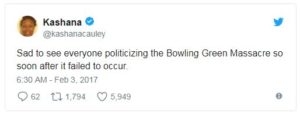Facebook Defeats Lawsuit By User Suspended Over ‘Bowling Green Massacre’–Shulman v. Facebook
 This lawsuit is detritus from the KellyAnne Conway “Bowling Green Massacre” fiasco. You may recall that Conway, in her official White House role, referred to a “massacre” at Bowling Green that never happened. The plaintiff says he posted articles to Facebook allegedly showing that the media unfairly targeted Conway. The media publishers allegedly reported his posts as “spam” (though DMCA takedown notices would have made more sense…?), and Facebook subsequently suspended his ability to post on Facebook. His pro se lawsuit goes nowhere.
This lawsuit is detritus from the KellyAnne Conway “Bowling Green Massacre” fiasco. You may recall that Conway, in her official White House role, referred to a “massacre” at Bowling Green that never happened. The plaintiff says he posted articles to Facebook allegedly showing that the media unfairly targeted Conway. The media publishers allegedly reported his posts as “spam” (though DMCA takedown notices would have made more sense…?), and Facebook subsequently suspended his ability to post on Facebook. His pro se lawsuit goes nowhere.
His Constitutional claims fail because Facebook isn’t a state actor, and 1983 claims have not succeeded against Facebook. Cites to Forbes v. Facebook and Young v. Facebook. The court sidesteps Section 230, but it should have also applied here.
The Americans with Disabilities Act claim against Facebook fails. The plaintiff alleged: “[a]s a Permanently Disabled American, Plaintiff relies upon means of communications and in specific, FACEBOOK.COM to stay in touch with family, friends, to stay current on and express his opinions and ideas with others. Suspension of Plaintiff[f]’s FACEBOOK.COM comment posting right represents an impediment to his supporting his recovery and adapting to his disabilities, over political differences, under the Americans with a [sic] Disabilities Act…” The court responds: “Plaintiff fails to allege any facts relevant to his ADA claim or even specify what part of the ADA Facebook allegedly violated.”
The New Jersey Law Against Discrimination claim against Facebook also fails. The court says this law only applies to employment discrimination, and the law doesn’t cover discrimination based on political affiliation.
There remain some interesting and underexplored issues about when, if ever, an Internet service violates state or federal antidiscrimination laws when exercising its editorial control. This case was not the vehicle to test those claims.
Instead, this would have been a great anti-SLAPP case., and it provides another data point in support of federal anti-SLAPP protection. It appears the plaintiff sought to rehabilitate Conway’s lies about a matter of substantial social importance: fake terrorism attacks on US soil by foreigners. We need a team effort–from the media to Internet platforms to each one of us–to combat these lies and discourage the government from making more. Indeed, I think Facebook’s continued success as a media platform depends on its efforts to reduce the visibility of people virally propagating and giving credibility to our government’s lies. We must ensure that the law does not hinder Facebook (and others) from doing this vitally important work.
Case citation: Shulman v. Facebook, Inc., 2017 WL 5129885 (D. N.J. Nov. 6, 2017)
